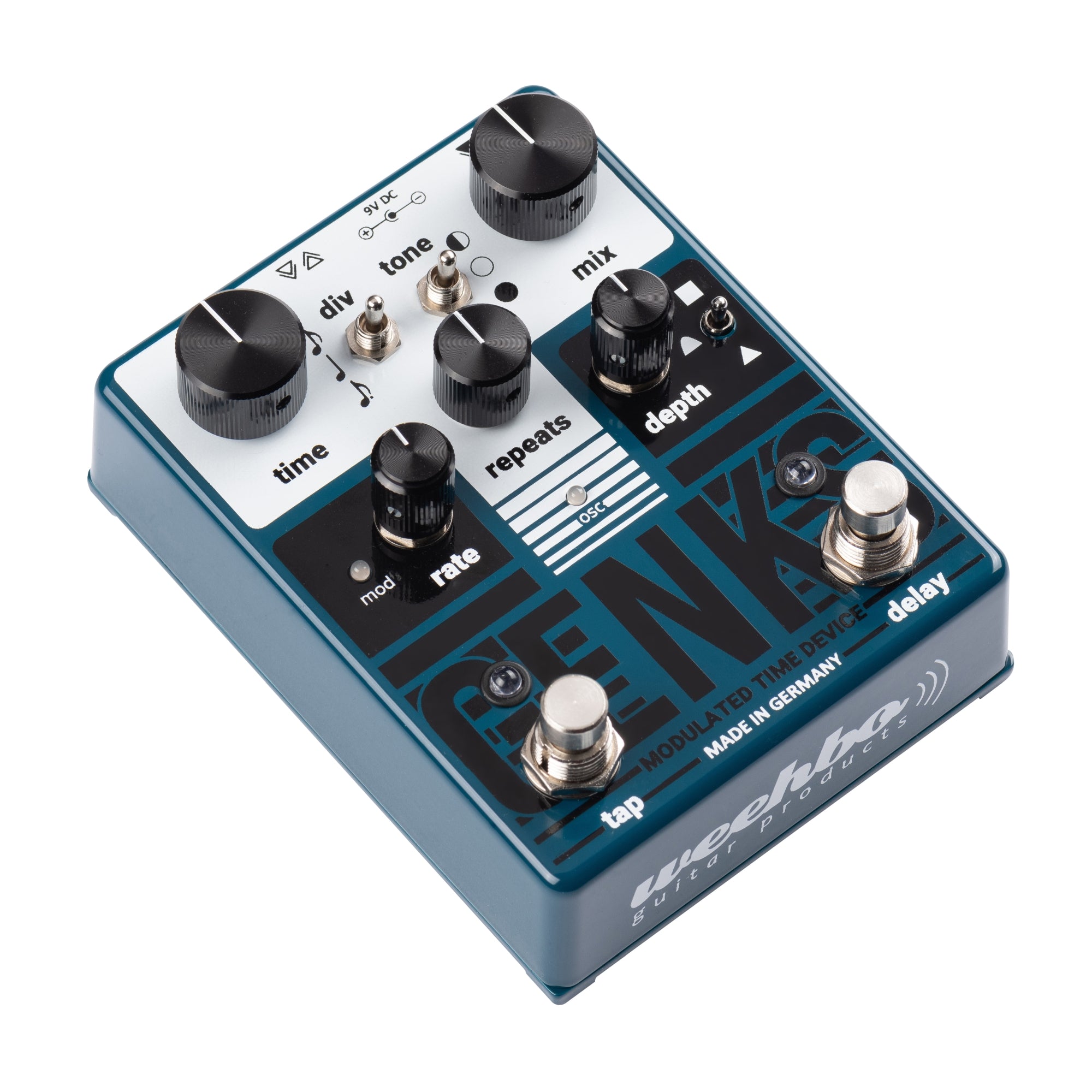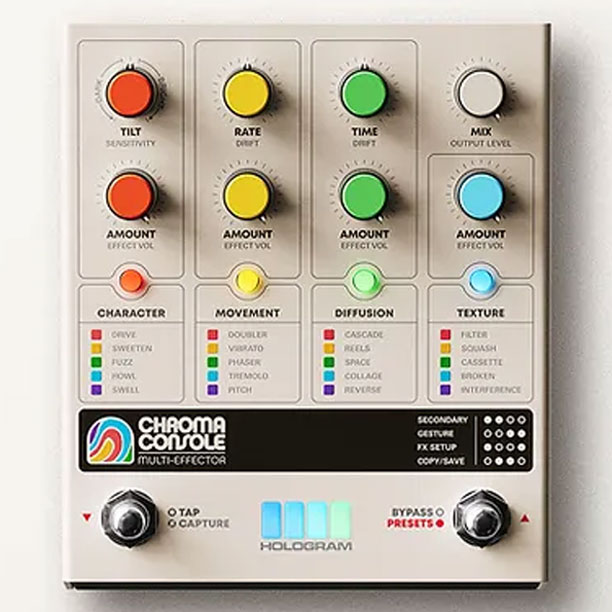GENKS - Modulated Time Device
Por um escritor misterioso
Descrição
The GENKS is our interpretation of a classic voiced, analog sounding delay, equipped with modern features like tap tempo, modulation, fx loop, trails and oscillation mode.
WHAT IS THE GENKS? The GENKS is our interpretation of a classic voiced and analog sounding delay. Equipped with a bunch of modern features like tap tempo, modulation, fx loop, trails and oscillation mode the GENKS leaves no wish unfulfilled! The delay circuit is based around the well known and iconic PT2399 chip. Thanks to careful filtering and signal processing we managed to create an authentic delay pedal with a unique touch. Whether you are looking for crisp slap-back echos, lush ambient delay lines with that extra kind of warble in the repeats or more classic, longer delays with fantastic bucket-brigade character - the GENKS can do it! FEATURES classic, analog voiced delay with max. delay time of 600 ms tap tempo with 3 division modes (4th, 8th and dotted 8th) toggle switch to choose between bright, warm saturated or dark repeats on/off switchable modulation with separate rate and depth controls; 3 waveforms including sinewave, triangular and rectangular; modulation speed 1 - 10 Hz oscillation mode (endless repeats) with longpress on tap button buffered fx loop for delay signal with internal controls for send and return levels all analog circuit for dry signal path buffered bypass with trails or true bypass with relay system and soft switch designed, engineered and hand built in Germany TAP TEMPO / OSCILLATION There are two ways how to set the desired delay time on the GENKS: with the time knob (knob controlled mode) or with the tap button (tap tempo mode). To use the tap tempo mode simply tap your tempo by pressing the tap button for short times. The GENKS needs at least two taps to calculate a tempo, the more taps the more precise is the tempo thanks to averaging. Once the GENKS switches to tap controlled mode, the tap LED flashes in time with the delays. For better indication, the LED remains on the whole time in knob controlled mode. Use the tap divide toggle to easily generate 4th, 8th or dotted 8th tempo repeats. By pressing and holding the tap button, the GENKS will switch to oscillation mode (orange LED is on). This function is momentary, once you release the button the oscillation will decay. How fast and how heavy the oscillation rises depends on other set parameters like time, mix and tone - therefore enjoy playing around with it! MODULATION Besides the careful filtering and processing of the delay signal, the modulation circuit is the other core element of the GENKS that makes it sound outstanding and unique. The modulation speed can be set by the RATE knob and ranges vom 1 Hz to 10 Hz. The intensity of the modulation is controlled by the DEPTH knob. You can choose between three different waveforms for the modulation: sinewave, triangular and rectangular. Sinewave and triangular deliver more smooth changes whereas rectangular could easily sound more harsh and dominant. The mod LED pulsates in sync with the modulation speed and selected waveform setting. Slower modulation speeds with low intensity are perfect to fatten up the sound or to create some kind of three-dimensional sound. More extreme settings with fast speed and high intensity are useful for vibrato kind of effects or pitch-shifted repeats. There are two modulation modes for the GENKS: latching or momentary. In latching mode you can toggle between modulation on/off by pressing the delay button for more than one second. The modulation LED color will change from green (modulation on) to red (modulation off). Momentary mode gives you the possibility to enable the modulation only when pressing and holding the delay button - so cool, isn't it? To toggle between the two modes, simply press and hold the tap button during power-up until the tap LED flashes three times. Factory setting for modulation is latching mode. FX LOOP The fx loop is part of the wet signal path only, so you can have your delay signal processed through further effects. This opens up a whole new world in terms of creativity and sound design. Thinks you should definitely try out are chorus, phaser and octaver! Keep in mind: sometimes less is more to create a sound which also cuts great through a mix, so it could be helpful to turn the modulation off. To use the fx loop, just connect a TRS cable (stereo) to the fx loop jack - tip is send and ring is return. Internally there are two trimpots for setting the send and return levels of the buffered fx loop. If the fx loop is not used (no cable is connected to the jack), the whole fx loop circuit is relay bypassed to guarantee best signal quality with as little signal processing as necessary. Since the fx loop is only part of the wet circuit, you can also use the fx loop as a wet out. Use a TS cable (mono) and connect the fx loop jack to your following signal chain (e.g. pedal or amplifier input). In this configuration the normal output jack of the GENKS works as a dry out. So you can simply create a full-featured dry/wet setup by using two TS cables (mono) for these jacks - great! BYPASS MODES The GENKS offers two different bypass modes: relay true bypass or buffered bypass with trails. In true bypass mode, all electronics are removed from the signal path when the delay is switched off. The signal passes through the bypass relay by the shortest possible distance. In buffered bypass mode the signal is buffered even when the delay is switched off, this allows the repeats to decay naturally. To toggle between the two modes, simply press and hold the delay button during power-up until the delay LED flashes three times. Factory setting for bypass mode is relay true bypass. PROGRAMMABLE SWITCH-ON STATES The GENKS has a memory function which can be used to save the switch-on state of the following parameters: delay: on / off modulation: on / off time mode: tap tempo / knob controlled mode time value (if device is in tap tempo mode) To save your current settings for the next startup just press and hold both buttons until both white LEDs flashes three times. To reset the device to factory settings, simply press and hold both buttons during power-up of the device until both white LEDs flashes three times. Factory settings are: delay off, modulation on, knob controlled mode. Note that also settings for bypass mode and modulation mode will be reset to factory settings. POWER REQUIREMENTS You have to insert a standard 9 volt DC power adaptor (2.1 mm with negative tip) into the dc jack to power up the pedal. It runs off 9 volt DC only, do NOT use adaptors with higher voltages or alternating current (AC). The maximum current draw is 75 mA, but we recommend to use a power adaptor with stabilized output voltage and at least 100 mA output current. DOCUMENTS User Manual Internal Controls TECHNICAL SPECIFICATIONS input impedance(20 Hz - 20 kHz): > 485 kOhm output impedance(20 Hz - 20 kHz): < 10 kOhm delay range: 60 ms to 600 ms modulation speed: 1 Hz to 10 Hz bypass: relay true bypass or buffered bypass with trails current draw: 75 mA power input: 9V DC, center negative, 2.1 mm plug, polarity and overvoltage protected dimensions: 95 x 120 x 55 mm weight: 400 g
WHAT IS THE GENKS? The GENKS is our interpretation of a classic voiced and analog sounding delay. Equipped with a bunch of modern features like tap tempo, modulation, fx loop, trails and oscillation mode the GENKS leaves no wish unfulfilled! The delay circuit is based around the well known and iconic PT2399 chip. Thanks to careful filtering and signal processing we managed to create an authentic delay pedal with a unique touch. Whether you are looking for crisp slap-back echos, lush ambient delay lines with that extra kind of warble in the repeats or more classic, longer delays with fantastic bucket-brigade character - the GENKS can do it! FEATURES classic, analog voiced delay with max. delay time of 600 ms tap tempo with 3 division modes (4th, 8th and dotted 8th) toggle switch to choose between bright, warm saturated or dark repeats on/off switchable modulation with separate rate and depth controls; 3 waveforms including sinewave, triangular and rectangular; modulation speed 1 - 10 Hz oscillation mode (endless repeats) with longpress on tap button buffered fx loop for delay signal with internal controls for send and return levels all analog circuit for dry signal path buffered bypass with trails or true bypass with relay system and soft switch designed, engineered and hand built in Germany TAP TEMPO / OSCILLATION There are two ways how to set the desired delay time on the GENKS: with the time knob (knob controlled mode) or with the tap button (tap tempo mode). To use the tap tempo mode simply tap your tempo by pressing the tap button for short times. The GENKS needs at least two taps to calculate a tempo, the more taps the more precise is the tempo thanks to averaging. Once the GENKS switches to tap controlled mode, the tap LED flashes in time with the delays. For better indication, the LED remains on the whole time in knob controlled mode. Use the tap divide toggle to easily generate 4th, 8th or dotted 8th tempo repeats. By pressing and holding the tap button, the GENKS will switch to oscillation mode (orange LED is on). This function is momentary, once you release the button the oscillation will decay. How fast and how heavy the oscillation rises depends on other set parameters like time, mix and tone - therefore enjoy playing around with it! MODULATION Besides the careful filtering and processing of the delay signal, the modulation circuit is the other core element of the GENKS that makes it sound outstanding and unique. The modulation speed can be set by the RATE knob and ranges vom 1 Hz to 10 Hz. The intensity of the modulation is controlled by the DEPTH knob. You can choose between three different waveforms for the modulation: sinewave, triangular and rectangular. Sinewave and triangular deliver more smooth changes whereas rectangular could easily sound more harsh and dominant. The mod LED pulsates in sync with the modulation speed and selected waveform setting. Slower modulation speeds with low intensity are perfect to fatten up the sound or to create some kind of three-dimensional sound. More extreme settings with fast speed and high intensity are useful for vibrato kind of effects or pitch-shifted repeats. There are two modulation modes for the GENKS: latching or momentary. In latching mode you can toggle between modulation on/off by pressing the delay button for more than one second. The modulation LED color will change from green (modulation on) to red (modulation off). Momentary mode gives you the possibility to enable the modulation only when pressing and holding the delay button - so cool, isn't it? To toggle between the two modes, simply press and hold the tap button during power-up until the tap LED flashes three times. Factory setting for modulation is latching mode. FX LOOP The fx loop is part of the wet signal path only, so you can have your delay signal processed through further effects. This opens up a whole new world in terms of creativity and sound design. Thinks you should definitely try out are chorus, phaser and octaver! Keep in mind: sometimes less is more to create a sound which also cuts great through a mix, so it could be helpful to turn the modulation off. To use the fx loop, just connect a TRS cable (stereo) to the fx loop jack - tip is send and ring is return. Internally there are two trimpots for setting the send and return levels of the buffered fx loop. If the fx loop is not used (no cable is connected to the jack), the whole fx loop circuit is relay bypassed to guarantee best signal quality with as little signal processing as necessary. Since the fx loop is only part of the wet circuit, you can also use the fx loop as a wet out. Use a TS cable (mono) and connect the fx loop jack to your following signal chain (e.g. pedal or amplifier input). In this configuration the normal output jack of the GENKS works as a dry out. So you can simply create a full-featured dry/wet setup by using two TS cables (mono) for these jacks - great! BYPASS MODES The GENKS offers two different bypass modes: relay true bypass or buffered bypass with trails. In true bypass mode, all electronics are removed from the signal path when the delay is switched off. The signal passes through the bypass relay by the shortest possible distance. In buffered bypass mode the signal is buffered even when the delay is switched off, this allows the repeats to decay naturally. To toggle between the two modes, simply press and hold the delay button during power-up until the delay LED flashes three times. Factory setting for bypass mode is relay true bypass. PROGRAMMABLE SWITCH-ON STATES The GENKS has a memory function which can be used to save the switch-on state of the following parameters: delay: on / off modulation: on / off time mode: tap tempo / knob controlled mode time value (if device is in tap tempo mode) To save your current settings for the next startup just press and hold both buttons until both white LEDs flashes three times. To reset the device to factory settings, simply press and hold both buttons during power-up of the device until both white LEDs flashes three times. Factory settings are: delay off, modulation on, knob controlled mode. Note that also settings for bypass mode and modulation mode will be reset to factory settings. POWER REQUIREMENTS You have to insert a standard 9 volt DC power adaptor (2.1 mm with negative tip) into the dc jack to power up the pedal. It runs off 9 volt DC only, do NOT use adaptors with higher voltages or alternating current (AC). The maximum current draw is 75 mA, but we recommend to use a power adaptor with stabilized output voltage and at least 100 mA output current. DOCUMENTS User Manual Internal Controls TECHNICAL SPECIFICATIONS input impedance(20 Hz - 20 kHz): > 485 kOhm output impedance(20 Hz - 20 kHz): < 10 kOhm delay range: 60 ms to 600 ms modulation speed: 1 Hz to 10 Hz bypass: relay true bypass or buffered bypass with trails current draw: 75 mA power input: 9V DC, center negative, 2.1 mm plug, polarity and overvoltage protected dimensions: 95 x 120 x 55 mm weight: 400 g

GENKS - Modulated Time Device

Surface Modulation via Conjugated Bithiophene Ammonium Salt for Efficient Inverted Perovskite Solar Cells

Weehbo Guitar Products

AES E-Library » Complete Journal: Volume 43 Issue 5

New Pedal: Weehbo Genks Modulated Time Device

Weehbo Guitar Products

New Pedal: Weehbo Genks Modulated Time Device

Delicious Audio Guitar Pedal Blog, Boutique Effects News, Video Aggregator, Buyer Guides

L S Fan Facility for Clean Energy Research

Energies, Free Full-Text

ALABS NOVADRIFT MODULATION
de
por adulto (o preço varia de acordo com o tamanho do grupo)







